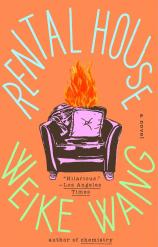Rental House
Review
Rental House
In some ways, Weike Wang's third novel, RENTAL HOUSE, seems to pick up shortly after her second, JOAN IS OKAY, left off. Of course, the two books are not really connected. But JOAN IS OKAY was set during the months just before and during the initial COVID-19 outbreak. As RENTAL HOUSE opens, it's the summer of 2021, and people are just starting to emerge from the pandemic and explore a return to "normalcy."
Keru and her husband, Nate, have decided to enjoy a few weeks away from their cramped New York City apartment and rent a house in Chatham on Cape Cod. After a week on their own (with their huge sheepdog, Mantou), they'll spend a week hosting each set of in-laws there: Keru's parents, Chinese immigrants who have settled in central Minnesota, and Nate's parents, white working-class folks hailing from the Blue Ridge Foothills in North Carolina.
"Like Wang's other work, RENTAL HOUSE is funny in a peculiar, truly unexpected way. In the end, it offers a unique vision of what it might take for this couple to manage a future that could work for both of them --- and their respective families."
Right off the bat, the two sets of parents' wildly different outlooks on COVID shed light on their personalities. Keru's parents drive from Minnesota to Massachusetts in shifts, noshing on trail mix in the car and taking turns sleeping so they don't run the risk of eating in a restaurant or sleeping in a hotel. Nate's parents are skeptical about vaccines and scornful of face masks.
This also serves to highlight some of the cultural and personal differences between Keru and Nate, who met at a party when they were undergraduates at Yale. Now, years later, Keru is a highly paid consultant, while Nate is an academic, an assistant professor studying fruit flies and holding office hours in his windowless office. On their own, Keru and Nate manage to mostly avoid conflict, entrenched as they are in their respective careers and their life in New York City. But being in such close quarters with each of their parents and under such close scrutiny by essential outsiders brings some of their inner tensions to the surface, whether it's their hesitance to have children or the differences in their approach to financial planning.
Fast forward five years and to the second main part of the novel, set in another vacation rental. This time, the differences between Keru and Nate's earning potential have become even more stark. Keru has relocated to Chicago to become a director of that office for her consulting firm. Nate has been awarded tenure at his private college, but neither his salary nor the dankness of his office reflects his change in status. They decide to reconnect --- on their own this time --- at a luxury bungalow in a Catskills resort. Nate has just turned 40, and Keru's 40th birthday is on the horizon, prompting numerous tense discussions about whether or not she wants a party and a dawning realization that they have a dwindling number of friends who would even attend.
By this point, the couple has made their child-free intentions clear, though they're still coming to terms with what that decision will mean for them in the long run. This is cast into high relief when they encounter fellow vacationers (Romanians on a short-term appointment in the United States) and their young son. When the wife labels Nate and Keru "DINKs" (for Double Income No Kids), Keru is especially taken aback by the dismissiveness of the label. And when Nate's ne'er-do-well brother and his girlfriend show up, matters really come to a head.
RENTAL HOUSE is a fascinating snapshot of a couple at two specific moments in their history, navigating big questions while also dealing with small ones, like where to go to brunch or how to manage local leash laws. That's the narrative tightrope that Wang walks here. She is both keenly observing and documenting these two very specific vacation dynamics while also blowing the top off the huge questions that Keru and Nate are negotiating, often in their own individual minds and without (for better or for worse) consulting their partner.
Like Wang's other work, RENTAL HOUSE is funny in a peculiar, truly unexpected way. In the end, it offers a unique vision of what it might take for this couple to manage a future that could work for both of them --- and their respective families.
Reviewed by Norah Piehl on December 4, 2024
Rental House
- Publication Date: November 4, 2025
- Genres: Fiction
- Paperback: 224 pages
- Publisher: Riverhead Books
- ISBN-10: 0593545559
- ISBN-13: 9780593545553




